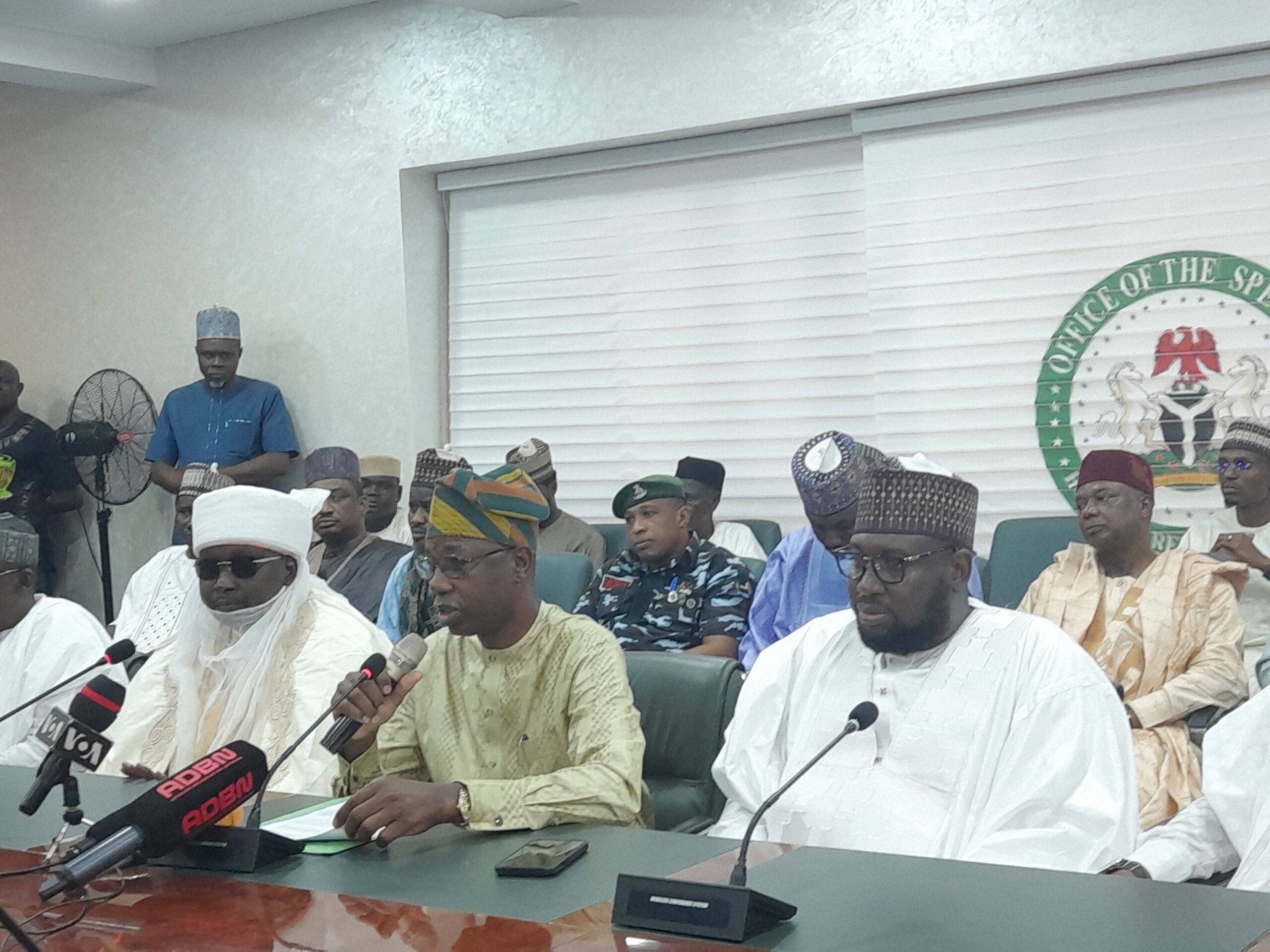News
First draft constitution ready in August, final copy for presidential assent after NASS’ voting out in August, 2025-Kalu

…as Committee calls for memoranda from Nigerians
Deputy Speaker of the House of Representatives, Hon. Benjamin Okezie Kalu has said that the first draft report of the ongoing review of the 1999 constitution would be ready in August 2025 just as the final clean copy for the presidential assent after the voting on the expected issues of concern by the two chambers of the national assembly would be out in August, 2025.
Kalu dropped the hints at a press conference by the House Committee on Constitution Review on Thursday.
It will be recalled that the committee on its inauguration, Monday, in Abuja gave a 24 month timeline for the conclusion of the exercise.
At the press conference, Kalu who doubles as the chairman of the committee said: “We are pushing to ensure that in our activities, that in no distance time, the first draft of the work we are trying to do in the constitution will be ready.
“This will be subject to approval of the work done by the subcommittee. Let me mention that our target, the first draft of the constitution will be out in August 2024.
“Second draft will be out in October 2024, we will commence zonal inputs from October 2024, we’ll keep collecting inputs from citizens from 14th October 2024 as we prepare for the last version or that last draft copy of the constitution.
“We are hoping that there will be a harmonization of the issues, on the 27th, 28th February 2025.
“We are hoping that during a technical working retreat that will take place in February 2025, the Senate and the House of Representatives documents will be harmonized.
“It is our desire that on the 17th of March 2025, we will have harmonized documents considered in the House. It is our believe that by April 2025, we will have the final copies of draft amendments produced.
“We are optimistic also that by 12th May 2025, we’ll have, the final clean copy of amendments bills agreed on.
“And we are looking at 22nd May 2025, as a time when we will have final report laid for consideration and voting.
“This is to say that members will be voting on the work we have done on this important date of 22nd May 2025
“We are believing that around the 29th of May or 13th of June knowing fully well what these important dates mean to Nigerians, we will expect the final concurrence of state assemblies secured.
“If it delays more than that, it will not go beyond August of 2025 because we believe that by August 2025, the president will receive the bills that will be presented to him for presidential assent. So, our targets that transmission of bills to Mr President for assent will take place August 2025.
“And with this, we are sure that our target to get this job done in 24 months will be achieved if we send it Mr President by August 2025 and hoping that by December we will have a constitution that’s fully amended. Thank you very our guests and honorable colleagues”.
The Deputy Speaker also called for submission of memoranda from different interest groups, Civil Society Organizations (CSOs), Labour Unions, relevant institutions of government and the members of the general public to aid the committee’s work.
He said that the thematic areas included Federal Structure and Power Devolution; Local Government/Local Government Autonomy; Public Revenue, Fiscal Federation, and Revenue Allocation; Nigerian Police and Nigerian Security Architecture; Comprehensive Judicial Reforms; Electoral Reforms to strengthen INEC to deliver transparent, credible, free and fair elections; Socio-economic and cultural rights as contained in Chapter 2 of the
constitution and Traditional Institutions.
Other were Issues of Gender; Strengthening the Independence of oversight institutions and agencies created by the constitution or pursuant to an Act of the National Assembly; Residency and Indigene Provisions; Immunity; The National Assembly; Process of state creation and State access to mining.
“In exercise of the powers conferred on the Legislature by Sections 4, 8, and 9 of the Constitution of the Federal Republic of Nigeria 1999 (as
Amended) and Order 20, Rule 30 of the Standing Orders of the House of
Representatives (11th Edition) and the Legislative Agenda of the 10th
House of Representatives, I am pleased to invite the Executive and
Judicial bodies, State Governments, Women Groups, Academics, Civil
Society Organizations, Labour Unions, Professional bodies, Ethnic
Nationalities, Nigerians in the Diaspora, Diplomats and the general public,
to submit memoranda or proposals for further alteration(s) of the 1999
Constitution (as amended) on the following thematic areas: The Federal Structure and Power Devolution; Local Government/Local Government Autonomy; Public Revenue, Fiscal Federation, and Revenue Allocation; Nigerian Police and Nigerian Security Architecture; Comprehensive Judicial Reforms; Electoral Reforms to strengthen INEC to deliver transparent, credible, free and fair elections; Socio-economic and cultural rights as contained in Chapter 2 of the
constitution; Traditional Institutions; Issues of Gender; Strengthening the Independence of oversight institutions and agencies created by the constitution or pursuant to an Act of the National Assembly; Residency and Indigene Provisions; Immunity; The National Assembly; Process of state creation; State access to mining”, he said.
The committee however extended the call for memoranda to “any other matter that will promote good governance and the welfare of all persons in our country on the principles of freedom, equality, and justice”.
News
Finally, IGP approves hunger protests across Nigeria

The Nigerian police has finally approved the planned nationwide protests and outlined conditions for participants.
The Inspector General of Police, Kayode Egbetokun, revealed this on Friday while addressing journalists in Abuja.
He urged all groups planning to participate in the proposed nationwide protest to submit their details to the Commissioners of Police in their respective states.
The police boss said this was to ensure the protest was peaceful.
Egbetokun said, “We acknowledge the constitutional right of Nigerian citizens to peaceful assembly and protest.
“However, in the interest of public safety and order, we urge all groups planning to protest to provide necessary details to the Commissioner of Police in the state where the protest is intended to take place.
“To facilitate a successful and incident-free protest, they should please provide the following information: state the proposed protest routes and assembly points; expected duration of the protest; and names and contact details of protest leaders and organisers.”
The police boss said the information expected from the organisers also include measures to prevent hijacking by criminal elements, as well as key identifiers for possible isolation of potential troublemakers.
By providing the information, he said, the police will be able to deploy adequate personnel and resources to ensure public safety.
He said the police needed to know the specific routes and areas for the protest to avoid conflicts with other events or activities.
Mr Egbetokun said the police will “establish clear communication channels with protest leaders to address any concerns or issues that may arise; minimise the risk of violence, property damage, or other criminal activity.
“We encourage all protesters to cooperate with the police, obey the law, and adhere to global best practices for peaceful assembly to guarantee a safe and successful exercise of their rights.
News
Reps North-West Caucus Beg Youths, Citizens In The Region Not To Join Planned Protest

News
Reps Applaud FCT Minister, Wike On AICL Improved Revenue, Infrastructure

-

 News20 hours ago
News20 hours agoIwuanyanwu was a Heavyweight in all ramifications-Abaribe
-

 News19 hours ago
News19 hours agoTinubu, Southern Govs Mourn Iwuanyanwu
-

 News18 hours ago
News18 hours agoSokoto Governor, Aliyu’s Wife Holds Lavish Birthday As Guests Spray Dollar Notes On Her Amid Hunger, Hardship
-

 News18 hours ago
News18 hours agoProtest: President Tinubu In Closed-door Meeting With Traditional Rulers (Video)
-

 News20 hours ago
News20 hours agoTinubu’s Presidency Is Failing Nigerians – Afenifere
-

 News15 hours ago
News15 hours agoNationwide protest: ‘Airport Is Filled Up, Govs, Senators, Reps, Ministers Traveling Abroad’ — Fayose
-

 News20 hours ago
News20 hours agoIGP Orders DPOs, Their Men To Storm Vulcanizer Shops Ahead Of Planned Nationwide Protest
-

 News19 hours ago
News19 hours agoCourt fixes date to hear suit challenging Shaibu’s reinstatement







